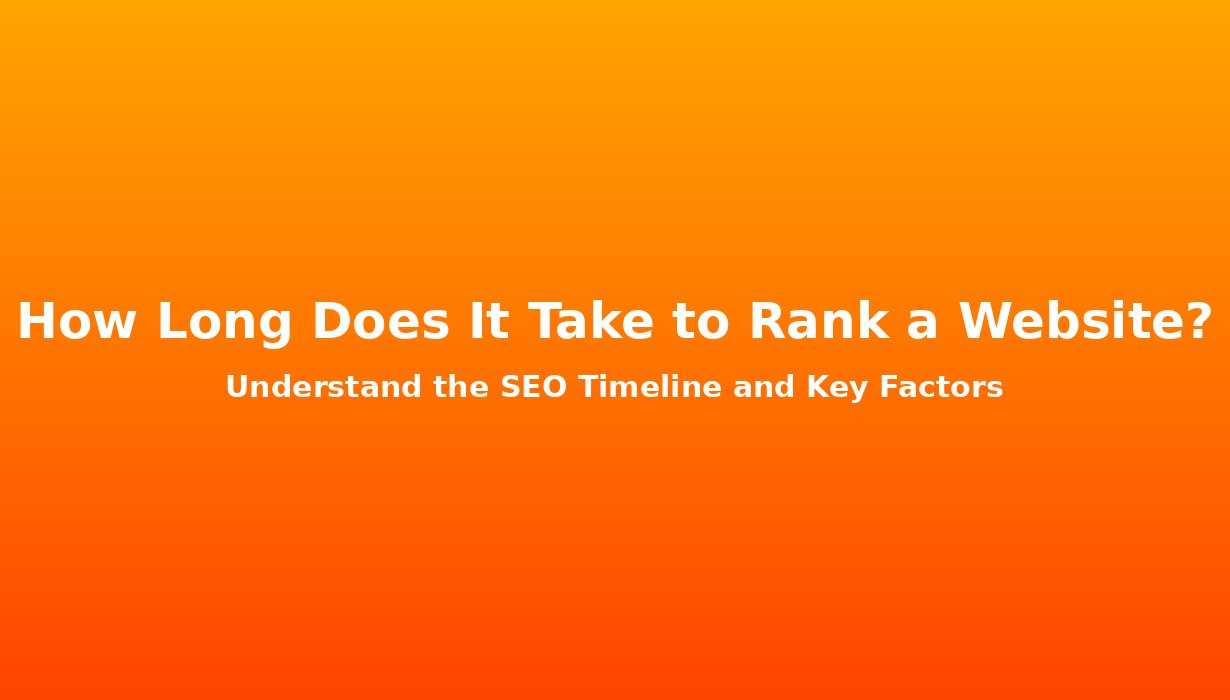
11
How Long Does It Take to Rank a Website?
Wondering how long it takes to rank a website? This comprehensive guide breaks down the SEO timeline, from initial setup to long-term growth, highlighting key factors that influence your rankings. Learn realistic expectations and effective strategies to improve your search engine visibility.
How Long Does It Take to Rank a Website?
Table of Contents
- Introduction
- Understanding the SEO Timeline
- Initial Phase: 0-3 Months
- Growth Phase: 3-6 Months
- Maturity Phase: 6-12 Months
- Long-Term Phase: 12+ Months
- Factors Affecting the SEO Timeline
- Competition
- Content Quality
- Backlink Profile
- Website Age and Authority
- SEO Strategy
- Realistic Expectations
- Conclusion
When it comes to search engine optimization (SEO), one of the most frequently asked questions is: "How long does it take to rank a website?" The answer, like many things in the digital marketing world, is not straightforward. It depends on various factors, including competition, the quality of your content, and the effectiveness of your SEO strategies. In this article, we’ll break down these elements to give you a clearer picture of the timeline for ranking a website.
Understanding the SEO Timeline
1. Initial Phase: 0-3 Months
In the first few months, your website is primarily in the setup phase. During this time, you'll focus on:
- Technical SEO: Ensuring your website is crawlable and indexable by search engines. This includes optimizing your website's speed, mobile-friendliness, and fixing any technical issues.
- Content Creation: Starting to build high-quality, relevant content that addresses the needs and questions of your target audience.
- Link Building: Beginning to earn backlinks from reputable sites to build your website's authority.
2. Growth Phase: 3-6 Months
During the growth phase, you may start to see some movement in your search engine rankings, especially for less competitive keywords. Here’s what typically happens:
- Content Optimization: Continuously refining your content based on performance data and user feedback.
- Keyword Targeting: Focusing on long-tail keywords that are easier to rank for initially.
- Building Authority: Consistently earning more backlinks and mentions from other websites.
3. Maturity Phase: 6-12 Months
In this phase, your website should start gaining more substantial traction. You might notice:
- Ranking for Target Keywords: Achieving higher rankings for your primary target keywords.
- Increased Organic Traffic: Seeing a noticeable uptick in organic traffic as a result of your SEO efforts.
- Enhanced Domain Authority: Your domain authority should be improving, making it easier to rank for more competitive terms.
4. Long-Term Phase: 12+ Months
After a year, your website can be considered well-established. However, SEO is an ongoing process. Here’s what you can expect:
- Sustained Growth: Continued growth in traffic and rankings as you maintain and enhance your SEO strategies.
- Content Updates: Regularly updating old content to keep it relevant and valuable.
- Advanced Strategies: Implementing more advanced SEO tactics like schema markup, advanced link-building techniques, and expanding into new content areas.
Factors Affecting the SEO Timeline
Several variables can influence how quickly your website ranks:
- Competition: Highly competitive industries take longer to rank in due to the sheer number of websites vying for the same keywords.
- Content Quality: High-quality, informative content tends to rank faster as it better serves user intent.
- Backlink Profile: Websites with a strong backlink profile from authoritative sites generally rank quicker.
- Website Age and Authority: Older, more established websites typically rank faster than new ones due to their existing authority.
- SEO Strategy: A well-executed, comprehensive SEO strategy can significantly speed up the ranking process.
Realistic Expectations
While everyone hopes to rank their website quickly, it's crucial to set realistic expectations. SEO is a marathon, not a sprint. Expect to see significant results within 6-12 months, but remember that it can take longer depending on your niche and competition. Patience and persistence are key.
Conclusion
Ranking a website on search engines is a complex process influenced by multiple factors. By understanding the typical SEO timeline and the variables at play, you can better strategize your efforts and set realistic goals. Remember, consistent, high-quality work will pay off in the long run. Stay focused, keep optimizing, and your website will climb the ranks.
By following the insights provided in this article, you'll be better equipped to navigate the SEO landscape and achieve your ranking goals. SEO success doesn't happen overnight, but with dedication and the right strategies, it is certainly achievable.
Contact
Missing something?
Feel free to request missing tools or give some feedback using our contact form.
Contact Us